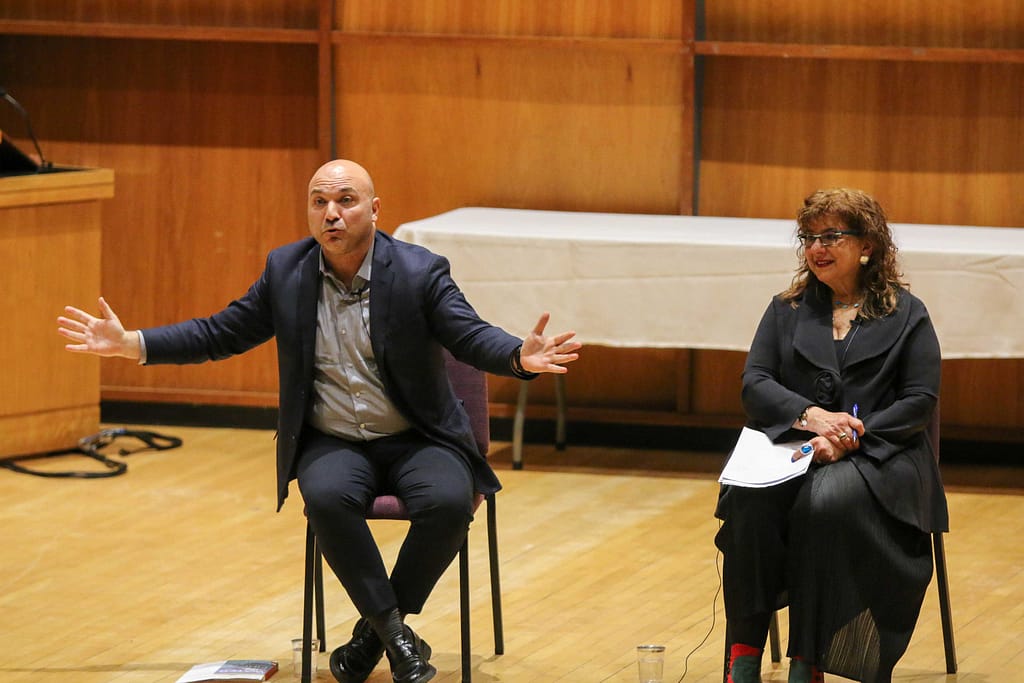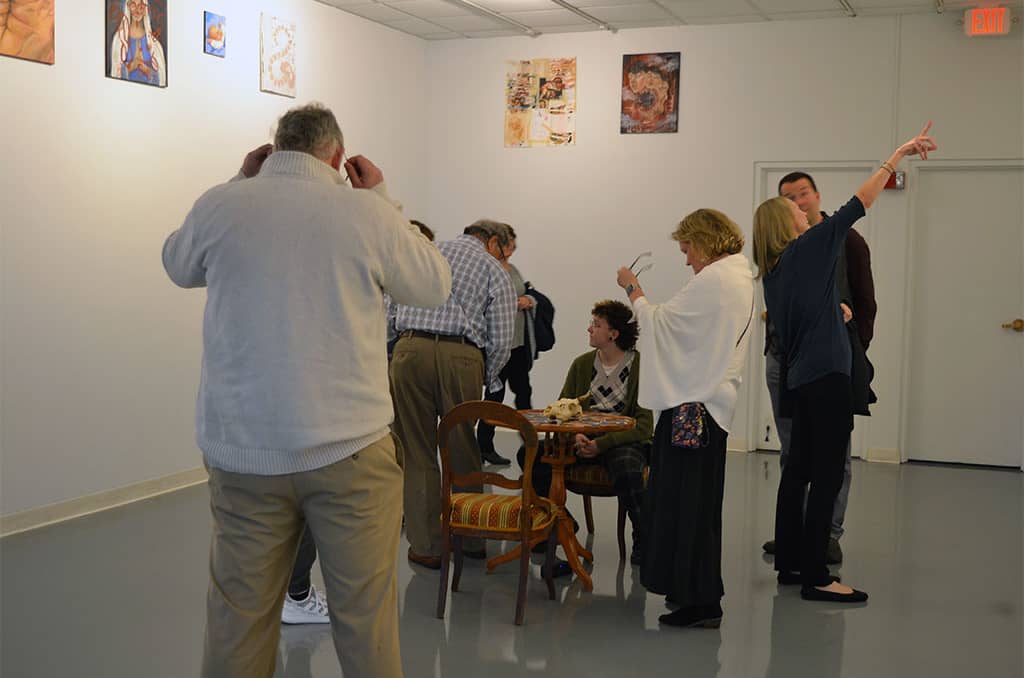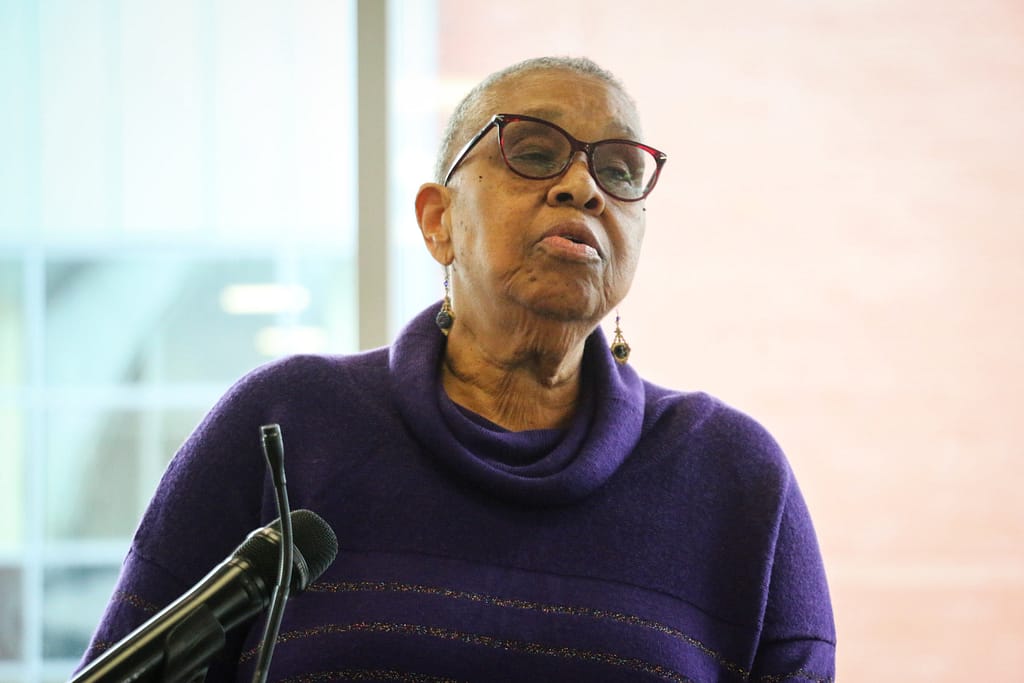Hoop house allows planting to start

The header photo shows the warm interior of the hoop house at the campus farm down the hill by the Observatory; directly above, Kristyn Achilich and a student move a tank by a sign reminding them of the day’s tasks; images below show some February greenery in the hoop house, Achilich and a student at work, and an open book on gardening. (All photos by Ethan Simmons)
Even outdoors the weather was warming up, considering it was still winter in Vermont on Tuesday, February 13, and everyone agreed it felt “downright glorious” in the tropically-warm “hoop house” down by the campus farm and permaculture site, where a gaggle of Saint Michael’s College students joined mentor Kristyn Dumont Achilich ’05 in surprisingly active pre-spring stirrings for their year-round and expanding teaching-and-cultivation operation.
Achilich, academic program coordinator of the College’s Garden & Permaculture Site, says this week has been an opportune time to impress on students “the cyclic events of the growing season,” while beginning to apply all the early training that students in the Permaculture site’s core team receive in her leadership development curriculum.
“This time of year is in truth the beginning of the farm year,” Achilich said this week. “However, it’s the midway point for many of our students. While there are some inherent challenges with the mating of the growing season and the academic calendar, I see it as a unique set of opportunities for leadership development and training.”
Achilich said she has been working hard to find a structure that works for the farm, the students’ learning and her capacity on campus, and now she firmly believes that “we are beginning to see the fruits of those labors this spring.”
Other parts of her early spring work with Saint Michael’s students who are interested in gardening include the greenhouses in Cheray Science Hall (thanks to the Biology Department), which are currently a nursery for young seedlings soon to be planted in the hoop house in the garden.

Other volunteers also show up to help as a result of many classes that have used the farm as a classroom over the past few years, she said. “We meet every Thursday from 4 p.m. to 6 p.m. This is something we are able to do this semester as a result of increasing the number of student internships and thus available hours as they connect to the farm and its programming.”
For Achilich, the change is huge: “Farming and food systems are complex systems and small one-hour chunks of time didn’t lend themselves well to the type of work and learning we do. But in this common time every week, we share progress on individual projects, farm needs, train on particularly important skills like seeding and seedling care processes in the Cheray greenhouses, crop-planning, plant variety selection and seed ordering, as well as early spring farm tasks that allow us to engage our campus community earlier in the spring than we have in the past. “
In addition, this is the time she and her team devote to specific pre-employment training skills such as setting individual goals through the “SMART” goal-development process and regularly practicing how they communicate and share their work on campus – “our elevator pitches if you will,” she said.
“Finally, it is to this group of students that I offer professional development and networking opportunities to like the Campus Farmer Summit that five of us attended at Stonehill College in Massachusetts last weekend, or the Winter Greens Growing Course hosted by UVM that I attended in early January with one of my students thanks to support from Karen Talentino, the College’s vice president for academic affairs.
Early beginnings
In 2015, Achilich said, she shared work-study students with Heather Lynch in the Office of Sustainability. “While that was a perfectly adequate set up at the time, the farm’s growth quickly exceeded the capacity of the few hours students had available, so by Spring of 2016 the farm had one dedicated student employment position and two that first summer and into the Fall of 2016,” she said.
During Spring 2017, her two student employees were joined by one intern, Graham Kaigle, ’18, who was engaged in the field of sustainable agriculture in food systems and went on to work at Trillium Hill Farm this past summer. He came back for as a second-semester intern this past fall and was joined by Kristen McDowell ’19.
“This evolution of student positions led to the structure we have this spring and is really representative of the amount of time it takes to learn the skills and content associated with this work, and is mirrored by student interest in the site as a classroom and pre-employment training opportunity,” Achilich said.
This spring the farm’s leadership core includes two student employees who fulfill positions as field crew leaders: Jonah Fanelli, ‘18 and Allison Plummer’19. Achilich said she also has three dedicated interns to whom she serves as both academic and site supervisor: Education & Outreach Coordinator Elizabeth McCarty ’18, responsible for creating accessible materials to engage the community in garden efforts, coordinating the Veterans Garden Initiative and working with other students and faculty to schedule farm visits; Business & Operations Coordinator Katie McKinnon ’20, responsible for tracking the true costs of production, organizing records in event that Saint Michael’s applies for Organic Certification, and tracking harvest and sales history; and Field Systems Coordinator Lindsay St. Pierre, ’20, responsible for creating the crop plan, seed-ordering, plant care and communicating on farm needs and progress to others in the group. Achilich hopes these three internships persist year after year in an effort to deepen students’ knowledge of food systems and sustainable agriculture as well as maintain continuity on the farm.
“I can’t lose well trained and dedicated students each semester, 






